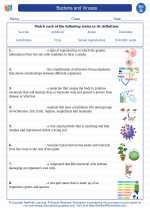Life: An Introduction
Life is a characteristic that distinguishes physical entities with biological processes, such as growth, reproduction, and response to stimuli, from those that do not have such processes. It is a complex and fascinating subject that encompasses a wide range of phenomena, from the molecular interactions within cells to the ecological relationships between organisms in an ecosystem.
Key Concepts:
- Cellular Structure: Life is organized into cells, which are the basic units of structure and function in living organisms. Cells can be prokaryotic (lacking a nucleus) or eukaryotic (containing a nucleus).
- Genetic Information: All living organisms contain genetic material, such as DNA or RNA, which carries the instructions for growth, development, and reproduction.
- Metabolism: Life processes involve the use of energy and the transformation of molecules to sustain the organism's activities.
- Homeostasis: Living organisms maintain internal stability by regulating their internal environment, despite external changes.
- Reproduction: Living organisms have the ability to produce offspring, ensuring the continuation of their species.
- Adaptation: Through the process of evolution, living organisms change over time in response to their environment, leading to the development of new traits and behaviors.
Study Guide:
When studying the topic of life, it is essential to explore the different levels of biological organization, from the molecular and cellular levels to the ecosystem level. Here are some key points to focus on:
- Cell Structure: Understand the differences between prokaryotic and eukaryotic cells, and how cellular structures and organelles contribute to the functions of a cell.
- Genetic Information: Explore the structure of DNA and RNA, and how genetic information is transmitted from one generation to the next through processes like replication and inheritance.
- Metabolism: Learn about the chemical reactions involved in metabolism, including anabolism (synthesis of molecules) and catabolism (breakdown of molecules), and how organisms obtain and utilize energy.
- Homeostasis: Investigate the mechanisms that living organisms use to maintain internal balance, such as feedback loops and regulation of body temperature.
- Reproduction: Examine the different modes of reproduction, including sexual and asexual reproduction, and the significance of reproduction in the continuation of life.
- Adaptation: Study the principles of evolution, natural selection, and how organisms adapt to their environments over time.
Additionally, it is important to explore the interconnectedness of living organisms within ecosystems, the diversity of life forms, and the impact of human activities on the environment.
By delving into these key concepts and study areas, you will gain a deeper understanding of the intricate and wondrous nature of life.
[Life] Related Worksheets and Study Guides:
.◂Science Worksheets and Study Guides Seventh Grade. Bacteria and Viruses
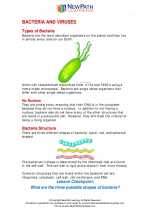
 Activity Lesson
Activity Lesson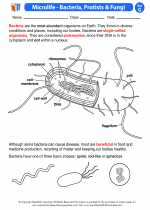
 Worksheet/Answer key
Worksheet/Answer key
 Worksheet/Answer key
Worksheet/Answer key
 Worksheet/Answer key
Worksheet/Answer key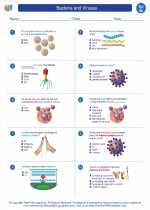
 Worksheet/Answer key
Worksheet/Answer key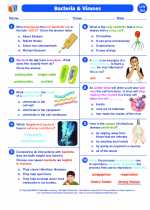
 Vocabulary/Answer key
Vocabulary/Answer key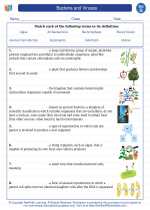
 Vocabulary/Answer key
Vocabulary/Answer key
 Vocabulary/Answer key
Vocabulary/Answer key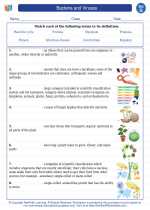
 Vocabulary/Answer key
Vocabulary/Answer key